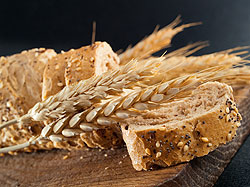Could wholegrain foods aid our immune systems?
Release Date 15 June 2011

University of Reading researchers are looking for volunteers for a new study which will examine the effects of wholegrain cereals on the immune system.
Studies have shown that this type of food, such as wholegrain breakfast cereals, breads, pasta, rice, may reduce the risk of cardiovascular diseases, certain cancers and type 2diabetes.
Recent research has suggested wholegrain also improves gut health by increasing the numbers of ‘good bacteria' in the gut. This may have a beneficial impact on the immune system which weakens as we get older.
The Wholegrain and Immunity (WHIM) study will investigate what effect consuming whole-grain on a regular basis has on those who have a habitually diet low in wholegrain.
Antonios Ampatzoglou, a PhD student within the University's Department of Food and Nutritional Sciences, is asking for middle-aged (40-65yr) men and women, with a BMI ranging between 25 and 35, who have less than one serving or 16g of whole-grain per day to participate in this important study.
Antonios said: "As we get older our immune system becomes weaker. Improving the numbers of good bacteria in the gut in middle-aged individuals may therefore offset the age-related decline in immunity. Volunteers will spend six weeks following a whole-grain diet and, after a break, six weeks following a refined-grain diet. During both the whole-grain diet and the refined-grain diet, volunteers will be provided with specific foods, including bread, pasta, rice, snacks and breakfast cereals, and asked to incorporate them into their diet in place of their usual foods.
"Bacteria in the gut can be roughly categorised as beneficial or unfavourable. At the end of each study, we will be counting the populations of certain bacterial genera in the samples and look at how these populations shift in relation to each other. We will, therefore, find out if a diet high in whole grain results in an increase in "good" bacteria numbers and/or a decrease in the numbers of "bad" bacteria. This will tell us whether individuals gain any benefit from whole-grain consumption in terms of the immune system and digestive health."
If you are interested in the study and would like to find out more please contact Jan Luff on 0118 378 7771 or email j.e.luff@reading.ac.uk.
Ends
Further press information from James Barr, University of Reading press office, 0118 378 7115, j.w.barr@reading.ac.uk
Notes for Editors
The Department of Food and Nutritional Sciences is the largest university department of its kind in the UK, combining state-of-the-art teaching facilities, a clinical nutrition unit, labs and the largest pilot processing plant in the UK. The department is internationally recognised for the quality of its research and enjoys a high public profile both domestically and internationally.
